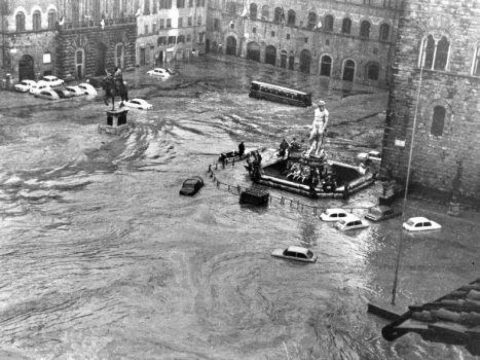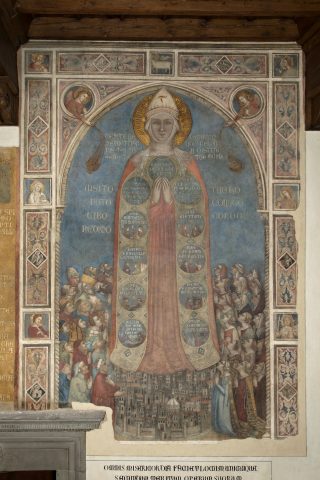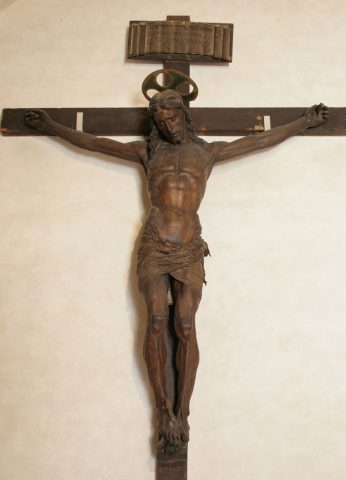Art damaged by calamities or human stupidity: Friends of Florence awards restorers to save it
- Piazza della Signoria, Florence, 1966.
- Madonna of Mercy, fresco, Museo del Bigallo, restored by Lidia Cinelli, winner of the Friends of Florence Prize in 2012.
- Francesco da Sangallo, Crucifixion, Basilica of the Santissima Annunziata, restored by Francesca Spagnoli, winner of the Friends of Florence Prize in 2014.
As any contemporary artist would be honoured to win art awards such as the Turner or the Hugo Boss Prize, similarly any restorer in the world would be delighted to receive the Friends of Florence Prize, a biennial grant consisting of a €20.000 check to pay for the restoration of a Florentine work of art. And this year, to commemorate the violent flood that hit Florence exactly 50 years ago, impairing precious artworks such as the Crucifixion painted by Cimabue for Santa Croce, or the Santa Maria del Fiore’s Baptistery doors, the Prize is dedicated to those artworks damaged by natural calamities, as said, but also by wars and terrorist attacks. “We are all witnessing at the moment the destruction of what I call the human memory, memories of culture and artworks, carried out in Syria by the IS. I wish the world could do something more about it” told to Cfa Countess Simonetta Brandolini d’Adda, President of Friends of Florence.
According to the official announcement and the mission of this active non-profit US organization founded in 1998 and collecting more than 600 donors, only projects dedicated to artworks located in Florence and visible to the public – or becoming visible after the restoration – will be eligible. But any restorer with proved experience is allowed to submit his/her proposal, wherever he/she or his/her studio is based. And this certainly represents a rare opportunity for all those who would like to challenge with their ideas and capabilities the Italian first place in this crucial field of the art world.
In this regard, if it’s a general consensus that Italy is not generating as many good artists as it did after the Second World War and during the Seventies, Italian restores are, as a matter of fact, in a better condition than their quasi-colleague artists. They can count on better schools, advanced technologies, and some supportive institutions such as FoF: “There is an entire generation of young restorers – continues Countess Simonetta Brandolini d’Adda – that should be arose to international attention, while most of the times they are left on the outskirts of the art community. They have to leave their country, or having to change their way of working because of the economy and not being able to find projects to carry on. And that is what first motivated our Prize from its beginning, in 2012. Basically we wanted to give restorers the chance of choosing an artwork and then having a donor supporting their project”. Moreover, Italian restorers can count on a great amount of artworks, architectures and books that, according to the Constitution of 1948, the Italian Republic must preserve (art. 9). Hence Italy represents a valuable opportunity. As proved a couple of years ago by the case of Flavio Marzo, an Italian expert in books restoration educated at the laboratory of the Novalesa Abbey – a small religious complex lost in the mountains around Turin -, who was hired by the British Library to manage its Islamic book collection and Qatar Digitisation Project.
The third edition of the Friends of Florence Prize will be operated in collaboration with the Salone dell’Arte e del Restauro, a main event dedicated to art preservation and restoration which takes place in Florence in November 2016. It will provide the FoF Prize with scientific support, promotion and a community of experts that will carefully select the candidates’ proposals and announce the winner. As Countess Brandolini d’Adda underlines: “even if the Prize is granted to a single proposal, it happens that thanks to the selecting process other proposals may emerge, and indeed find supporters”. It was the case of main artworks such as the Crucifixion by Donatello, preserved at the Museo Nazionale del Bargello, or the Annunciation by Filippo Lippi in the Basilica of St Lawrence, or the so called Horse Medici Riccardi, preserved at the Archaeological Museum of Florence. All of them found donors supporting their restoration, even if not winners of the Friends of Florence Prize.
Applicants have time until May 31, to submit their proposals.
November 25, 2020



